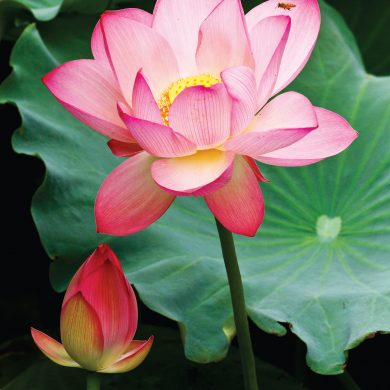Never can I thank my teacher enough for constantly saying to me, “Learn to behave.”
I discovered I could see myself reflected more clearly through others’ minds, especially through my Master’s unprejudiced mind, than through my own hazy understanding.
I began to associate with calm minds and to ask them how I looked from their mental perceptions, for I found there was a difference between what I thought others thought of me and what others actually thought of me in their inner minds.
It takes a lot of courage to risk a word battle, or other trouble, just for telling people their faults. That is why most people are afraid to criticize you to your face. Most people bite you behind your back and silently criticize you in their own minds. Your intimate friends do not criticize you openly for fear of offending you; but they criticize you inwardly, as you do them. If you want to know what your friends think about you, behave perfectly and keep constantly improving yourself by being unselfish, wise, calm, meditative, fearless, sweet, sincere, courteous, methodical, true to your word, and unafraid to be firm, and your friends will be so overwhelmed by your goodness that they will think, and talk loudly, about what you are.
Learn to make yourself behave and be happy, and you will influence all the people you meet to be well behaved and happy. Self-control at first produces unhappiness because of the separation from the pleasure-yielding senses. After self-control ripens, however, the soul begins to experience finer, happier perceptions and to enjoy itself far more than when it lived identified with the sense-pleasures. The devotee, suffering from fear of the feeling of emptiness, must realize that renunciation is not an end in itself. Rather, it is a means to an end, and teaches one to shift the attention from lesser sense-pleasures to deeper soul pleasures.
Never dwell on the thought of your shortcomings. Recall, instead, the memory of the good things you have done, and of the goodness that exists in the world. Convince yourself of your own innate perfection. Thus you will find yourself drawn to remember your eternal nature as a child of God.
The only worthwhile accomplishments are not those we achieve outwardly, but the victories we win over ourselves. Let us create inner dwellings of beautiful qualities, erecting them in valleys of humbleness where gather the rains of God’s mercy and of other people’s good wishes for us.
Divine grace can make fertile the most arid heart, transforming its brown desert into a verdant garden of inner happiness and peace.
If you want to be loved, start loving others who need your love. If you expect others to be honest with you, then start by being honest yourself. If you want others to sympathize with you, start showing sympathy to those around you. If you want to be respected, you must learn to be respectful to everyone, both young and old. If you want a display of peace from others, you must be peaceful yourself. If you want others to be religious, start being spiritual yourself. Whatever you want others to be, first be that yourself. Then, you will find others responding in like manner to you.
It is easy to wish that others would behave perfectly toward you, and it is easy to see their faults, but it is very difficult to conduct yourself properly and to consider your own faults. If you can remember to behave rightly, others will try to follow your example. If you can find your own faults without developing an inferiority complex, and can keep busy correcting yourself, then you will be using your time more profitably than if you spend it wishing others were better. Your good example will do more to change others than your wishing, your wrath, or your words.
The more you improve yourself, the more you will elevate others around you and the happier you will become. The happier you become, the happier will be the people around you.

Stagnant people are unhappy. Extremely ignorant people scarcely know how it feels to be either happy or unhappy. It is better to be unhappy about your own ignorance than to die happily with it. Wherever you are, remain awake and alive with your thought, perception, and intuition—ever ready to appreciate exemplary conduct and to ignore bad behavior. Your highest happiness lies in being ever ready to learn and to behave properly.
Most bored people who think they have exhausted the joys of life do not know that a world of solace lies in good books. The vacant mind is the workshop of worry and despair. In choosing books, the first preference should be given to spiritual books that are free from dogma. In studying, you must master one subject or more, but you should also know something of every other subject, including botany, logic, astronomy, music, languages, and politics. The study of physiology is important. Read a good scientific magazine every month.
Reading is the best indoor intellectual sport. It keeps your mind busy and your intellect exercised. One or two hours’ daily reading will give any person a liberal education in ten years, if he chooses worthwhile books. Don’t waste time and injure your mental faculties by reading purposeless or trashy books. Not to cultivate a genuine interest in books is to miss the heritage of the ages.
If you cannot get along with friends and the world, read books and keep company with those silent friends who have the power to comfort and inspire. Those who are socially inclined will find a new power to help humanity through the lessons of books written by noble and gifted people.
Read, mark, and inwardly digest selected passages from great books. Discuss important topics with intelligent people. Logically thinking over a given idea is the best way to develop originality in your ideas. When thinking, keep your eyes closed and your mind wholly concentrated on the subject of your study. Do nothing with only half-attention or half-heartedly.

Good books are your perpetual silent friends. When you are worried or grieved, take a book and bury yourself in it. Listen to the comforting and inspiring words of the great minds of the ages.
If you read spiritual books, choose those that contain Self-realization. Such books as the Bible and the Bhagavad Gita should not be read as you would read a novel. Read a passage, think about its meaning, and meditate on its truth. Then try to live the truth in life.
Read books after meditation. Criticize books with intuitive perception. Keep your mind busy most of the time with good books unless you are meditating. In your spare time, keep busy reading interesting books, which protect your mind from idle thoughts that create boredom and dissatisfaction.
Husband and wife should balance their love by self-control and by reading and discussing good books together, instead of by engaging their minds in fruitless family wars or peace-devastating matrimonial skirmishes.
If you want to be happy, learn to live alone and to plunge into introspection about every experience—good books, problems, religion, philosophy, and inner happiness. Contented, self-chosen, habitual seclusion is the price of real happiness. When you are forced into a crowd of talkers, retire within the cell of your deep thoughts and enjoy the peace of your inner fountain of silence.
Don’t joke too much. I, myself, as you know, like a good laugh, but if I make up my mind to be serious, no one can make me even smile. Be happy and cheerful—above all inwardly. Be outwardly grave, but inwardly cheerful.
Don’t waste the perception of God’s presence, acquired in meditation, by useless chatting. Idle words are like bullets: they riddle the milk pail of peace. In devoting time unnecessarily to conversation and exuberant laughter, you’ll find you have nothing left inside. Fill the pail of your consciousness with the milk of meditative peace, then keep it filled. Joking is false happiness. Too much laughter riddles the mind and lets the peace in the bucket flow out, wasting it.
Meditate regularly, and you will find a joy inside that is real. You will then have something you can compare to sense pleasures. That comparison will automatically make you want to forsake your sorrow-producing bad habits. The best way to overcome temptation is to have something more fulfilling with which to compare it.
Never let your mind be seduced by restlessness, through joking too much, too many distractions, and so on.
Of course, a little fun and laughter is good, occasionally. But don’t let light-mindedness possess you. I, too, like to laugh sometimes, as you know. But when I choose to be serious, nothing and no one can draw me out of my inner Self. Be deep in everything you do. Even when laughing, don’t lose your inner calmness. Be joyful inside, but always inwardly a little withdrawn. Be centered in the joy within.
Be deep in everything you do. Even when laughing, don’t lose your inner calmness. Be joyful inside, but always inwardly a little withdrawn. Be centered in the joy within.
Dwell always in the Self. Come down a little bit when you have to, to eat, or talk, or to do your work; then withdraw into the Self again. Be calmly active, and actively calm. That is the way of the yogi.
When a cloudy day comes, think of the clusters of sunny days that you have had. When the blues come and make you feel they are going to take a permanent lease on your life, think of the numberless days of happiness which you have enjoyed in the past. It is ingratitude to the Giver of all gifts to forget the healthy smiles enjoyed for fifty years just because you have been sick for six months. There is no sense in unbalancing your mind and forgetting years of happiness by taking too seriously the sorrows of a few weeks or a few months.
Be not afraid of this temporary mortal ignorance, for within your soul lies buried the unopened mine of the wisdom of God. Since you are made in His image, all His wisdom and happiness lie hidden somewhere in the disorganized cellar of your subconsciousness. To smile when all things are going well is easy and natural, but to smile when all things try to ruin you is difficult, super conscious, admirable, and the harbinger of lasting happiness. Become a smile specialist and a doctor of blues, healing all the sad and weary hearts you meet by the x-ray of your smiles.
When you are sick, do not concentrate on the length of your suffering, but dream about the youthful, healthful years you have already enjoyed. What you have had, you can have again if you try hard enough. To give up is the difficult, miserable way in the long run; to try hard until you succeed is the easiest way.

Banish sadness with joy; destroy sickening thoughts of failure with the tonic of success consciousness. Polish disharmony with the chisel of harmony. Cauterize worries with calmness. Cast sorrows into the flames of happiness. Shame unkindness by kindness. Dethrone sick thoughts and place King Vitality on the throne of right living. Banish restlessness and ignorance from the shores of your mind. Establish the kingdom of silence within, and the God of happiness will freely enter.
© 2006 Excerpted from “How to Be Happy All the Time.” Published by Crystal Clarity.
 Paramhansa Yogananda: Born in India in 1893, Paramhansa Yogananda was trained from his early years to bring India’s ancient science of Self-realization to the West. In 1920 he moved to the United States to begin what was to develop into a worldwide work touching millions of lives. Americans were hungry for India’s spiritual teachings, and for the liberating techniques of yoga. In 1946 he published what has become a spiritual classic and one of the best-loved books of the 20th century, Autobiography of a Yogi. In addition, Yogananda established headquarters for a worldwide work, wrote a number of books and study courses, gave lectures to thousands in most major cities across the United States, wrote music and poetry, and trained disciples. Yogananda’s message to the West highlighted the unity of all religions, and the importance of love for God combined with scientific techniques of meditation. www.crystalclarity.com
Paramhansa Yogananda: Born in India in 1893, Paramhansa Yogananda was trained from his early years to bring India’s ancient science of Self-realization to the West. In 1920 he moved to the United States to begin what was to develop into a worldwide work touching millions of lives. Americans were hungry for India’s spiritual teachings, and for the liberating techniques of yoga. In 1946 he published what has become a spiritual classic and one of the best-loved books of the 20th century, Autobiography of a Yogi. In addition, Yogananda established headquarters for a worldwide work, wrote a number of books and study courses, gave lectures to thousands in most major cities across the United States, wrote music and poetry, and trained disciples. Yogananda’s message to the West highlighted the unity of all religions, and the importance of love for God combined with scientific techniques of meditation. www.crystalclarity.com







